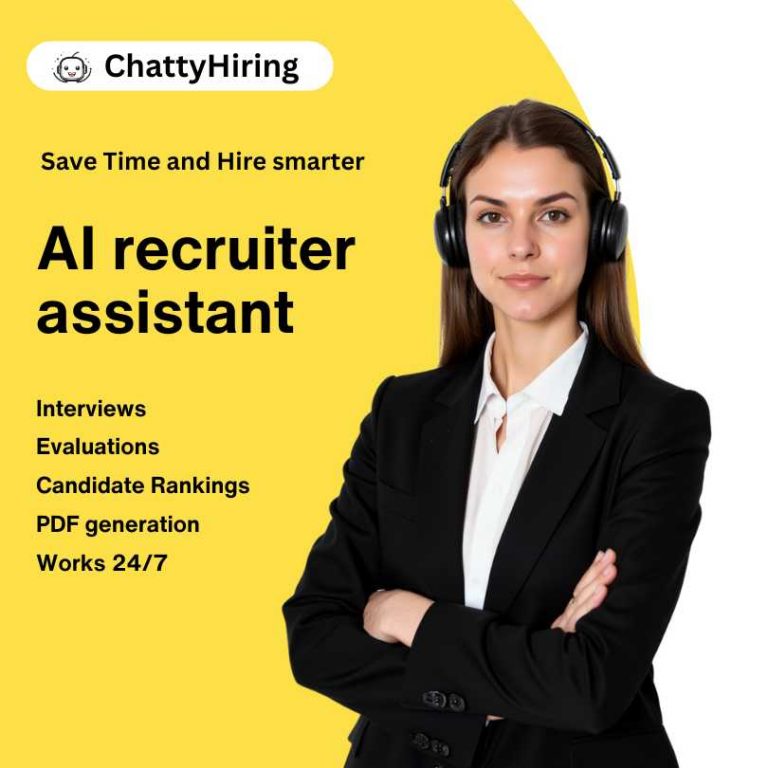The landscape of recruitment has undergone a significant transformation in recent years, particularly with the advent of virtual interviews powered by artificial intelligence (AI). As organizations strive to streamline their hiring processes, AI technology has emerged as a game-changer, offering innovative solutions that enhance efficiency and candidate experience. Virtual interviews, once a necessity during the pandemic, have now become a staple in the hiring toolkit, allowing companies to connect with talent from around the globe without the constraints of geographical boundaries.
This shift not only saves time and resources but also opens up a diverse talent pool that was previously inaccessible. However, while the convenience of virtual interviews is undeniable, the challenge lies in ensuring that these interactions remain personal and engaging. Candidates often report feeling disconnected during virtual interviews, which can lead to a lack of enthusiasm and engagement.
This is where the integration of AI can play a pivotal role. By leveraging AI technology, organizations can create a more personalized interview experience that resonates with candidates on a deeper level. In this article, we will explore the importance of personalization in virtual interviews, how AI can facilitate this process, and the future implications of these innovations.
Key Takeaways
- Virtual interviews with AI are becoming increasingly popular in the hiring process, offering efficiency and convenience for both employers and candidates.
- Personalization is crucial in virtual interviews to create a positive candidate experience and make them feel valued and engaged.
- AI technology can be leveraged to personalize virtual interviews by analyzing candidate data and behavior to tailor the interview process.
- Creating a human connection through AI in virtual interviews involves using technology to simulate natural conversation and empathy.
- Tips for making virtual interviews feel personal with AI include using personalized greetings, asking relevant and engaging questions, and providing real-time feedback.
Understanding the importance of personalization in virtual interviews
The Impact on Candidate Perception
Moreover, personalized virtual interviews can lead to better hiring outcomes. When interviewers tailor their questions and interactions based on a candidate’s background and qualifications, they can gain deeper insights into the candidate’s fit for the role and the organization.
Enhancing the Candidate Experience
This approach not only enhances the candidate experience but also improves the quality of hires, as interviewers are better equipped to assess candidates’ potential contributions to the team.
The Role of AI Technology
As organizations increasingly recognize the importance of personalization, they are turning to AI technology to help bridge the gap between efficiency and human connection.
Leveraging AI technology for personalized virtual interviews

AI technology offers a myriad of tools that can enhance personalization in virtual interviews. One of the most significant advantages is the ability to analyze vast amounts of data quickly. By utilizing AI algorithms, organizations can gather insights from candidates’ resumes, social media profiles, and previous interactions with the company.
This data can inform interviewers about candidates’ strengths, weaknesses, and preferences, allowing them to tailor their approach accordingly. For instance, AI can help identify key skills or experiences that align with the job requirements, enabling interviewers to ask targeted questions that delve deeper into those areas.
Additionally, AI-driven platforms can provide real-time feedback during interviews, suggesting follow-up questions based on candidates’ responses.
This dynamic interaction fosters a more engaging conversation and allows interviewers to adapt their style to suit each candidate’s communication preferences. By leveraging AI technology in this way, organizations can create a more personalized and effective virtual interview experience.
Creating a human connection through AI in virtual interviews
While AI may seem impersonal at first glance, it can actually facilitate a more human connection during virtual interviews when used thoughtfully. For example, AI-powered chatbots can be employed to conduct preliminary screenings or answer candidates’ questions before the interview process begins. This not only saves time for recruiters but also provides candidates with a sense of support and guidance as they navigate the application process.
Furthermore, AI can help interviewers prepare by providing insights into candidates’ personalities and communication styles. By understanding how a candidate prefers to engage—whether through direct questions or more conversational dialogue—interviewers can adjust their approach to foster a more comfortable atmosphere. This human-centric approach ensures that candidates feel heard and valued throughout the interview process, ultimately leading to a more positive experience for both parties.
Tips for making virtual interviews feel personal with AI
To maximize the effectiveness of AI in creating personalized virtual interviews, organizations should consider several best practices. First, it is essential to invest in robust AI tools that offer comprehensive data analysis capabilities. These tools should be able to gather insights from various sources and present them in an easily digestible format for interviewers.
Second, organizations should prioritize training for interviewers on how to leverage AI insights effectively. Interviewers should be encouraged to use data-driven insights as conversation starters rather than rigid scripts. This flexibility allows for organic discussions that can lead to deeper connections with candidates.
Lastly, incorporating elements of empathy into the interview process is vital. Interviewers should be reminded to actively listen and respond to candidates’ emotions and concerns during the conversation. By combining AI-driven insights with genuine human interaction, organizations can create a more personalized and engaging virtual interview experience.
Overcoming challenges in virtual interviews with AI

Despite the numerous benefits of using AI in virtual interviews, challenges remain that organizations must address. One significant concern is the potential for bias in AI algorithms. If not carefully monitored, AI systems may inadvertently perpetuate existing biases present in historical hiring data.
To mitigate this risk, organizations should regularly audit their AI tools and ensure they are designed to promote fairness and inclusivity. Another challenge is ensuring that candidates feel comfortable with technology during virtual interviews. Some candidates may be unfamiliar with video conferencing tools or may experience technical difficulties that hinder their performance.
To address this issue, organizations should provide clear instructions and support resources ahead of time, allowing candidates to familiarize themselves with the technology before the interview.
The role of emotional intelligence in AI-powered virtual interviews
Emotional intelligence (EI) plays a crucial role in enhancing the effectiveness of AI-powered virtual interviews. While AI can analyze data and provide insights, it lacks the ability to understand emotions and nuances in human interactions fully. Therefore, it is essential for interviewers to possess strong emotional intelligence skills to complement AI technology.
Interviewers with high EI can read candidates’ non-verbal cues and respond empathetically to their concerns or anxieties during the interview process. By combining emotional intelligence with AI-driven insights, organizations can create a more holistic approach to virtual interviews that prioritizes both data-driven decision-making and genuine human connection.
Customizing virtual interviews with AI for different candidates
One of the most significant advantages of using AI in virtual interviews is the ability to customize the experience for different candidates based on their unique backgrounds and qualifications. Organizations can leverage AI algorithms to segment candidates into different categories based on factors such as experience level, industry background, or even personality traits. By tailoring interview questions and formats according to these segments, organizations can create a more relevant and engaging experience for each candidate.
For example, entry-level candidates may benefit from more structured questions that assess foundational skills, while experienced professionals may appreciate open-ended questions that allow them to showcase their expertise.
Ensuring fairness and objectivity in AI-powered virtual interviews
Fairness and objectivity are paramount when implementing AI in virtual interviews. Organizations must ensure that their AI tools are designed to minimize bias and promote equitable treatment for all candidates. This involves regularly reviewing algorithms for potential biases and making necessary adjustments based on feedback from diverse stakeholders.
Additionally, organizations should establish clear guidelines for how AI insights are used during the interview process. Interviewers should be trained to interpret data responsibly and avoid making decisions solely based on algorithmic recommendations. By fostering a culture of fairness and transparency, organizations can build trust with candidates and enhance their overall hiring reputation.
The future of virtual interviews with AI: Innovations and trends
As technology continues to evolve, so too will the landscape of virtual interviews powered by AI. Emerging trends indicate that organizations will increasingly adopt advanced technologies such as natural language processing (NLP) and machine learning (ML) to enhance personalization further. These innovations will enable more sophisticated analysis of candidate responses and facilitate deeper insights into their motivations and cultural fit.
Moreover, as remote work becomes more prevalent, organizations may explore hybrid interview formats that combine both virtual and in-person elements. This approach could allow candidates to engage with teams face-to-face while still benefiting from the efficiency of AI-driven processes.
Embracing personalization in virtual interviews with AI
In conclusion, embracing personalization in virtual interviews powered by AI is essential for organizations seeking to attract top talent in today’s competitive job market. By leveraging AI technology thoughtfully, companies can create engaging experiences that resonate with candidates on a personal level while still maintaining efficiency in their hiring processes. As we move forward into an era where technology continues to shape recruitment practices, it is crucial for organizations to prioritize human connection alongside data-driven decision-making.
By doing so, they will not only enhance candidate experiences but also improve their overall hiring outcomes—ultimately leading to stronger teams and organizational success. For further insights on enhancing recruitment processes through technology, consider exploring resources from Hppy (https://gethppy.
com/) or HR Examiner (https://www.
hrexaminer.com/).
If you’re interested in learning more about how AI technology is revolutionizing recruitment solutions, check out this article on Unlocking Efficient Recruitment Solutions with AI Technology. It delves into the ways in which AI can streamline the hiring process and improve candidate experience. Additionally, if you want to explore the history of AI and its evolution from Alan Turing to ChatGPT, be sure to read The History of AI: From Alan Turing to ChatGPT. Understanding the roots of AI can provide valuable insights into its current capabilities and potential future developments.
FAQs
What is a virtual interview?
A virtual interview is a job interview that takes place remotely, typically using video conferencing technology. It allows employers and candidates to connect without being in the same physical location.
How can AI be used to conduct virtual interviews?
AI can be used to conduct virtual interviews by analyzing candidates’ facial expressions, tone of voice, and language to provide insights into their personality, communication style, and emotional intelligence. This can help make virtual interviews feel more personal and provide valuable data for hiring decisions.
What are the benefits of using AI for virtual interviews?
Using AI for virtual interviews can help streamline the hiring process, reduce bias, and provide valuable insights into candidates’ soft skills. It can also help create a more personalized and engaging experience for candidates, leading to a positive impression of the company.
Are there any potential drawbacks to using AI for virtual interviews?
Some potential drawbacks of using AI for virtual interviews include concerns about privacy and data security, as well as the potential for bias in the AI algorithms. Additionally, some candidates may feel uncomfortable being evaluated by AI rather than a human interviewer.
How can companies ensure that virtual interviews with AI feel personal?
To ensure that virtual interviews with AI feel personal, companies can use AI tools that are designed to create a more human-like interaction, such as natural language processing and sentiment analysis. They can also provide training for interviewers to use AI tools in a way that feels empathetic and respectful to candidates.
-

A passionate advocate for the future of HR innovation. With expertise in leveraging AI to revolutionize recruitment processes, Carlos has a clear vision: empower HR teams while creating meaningful candidate experiences.
View all posts



